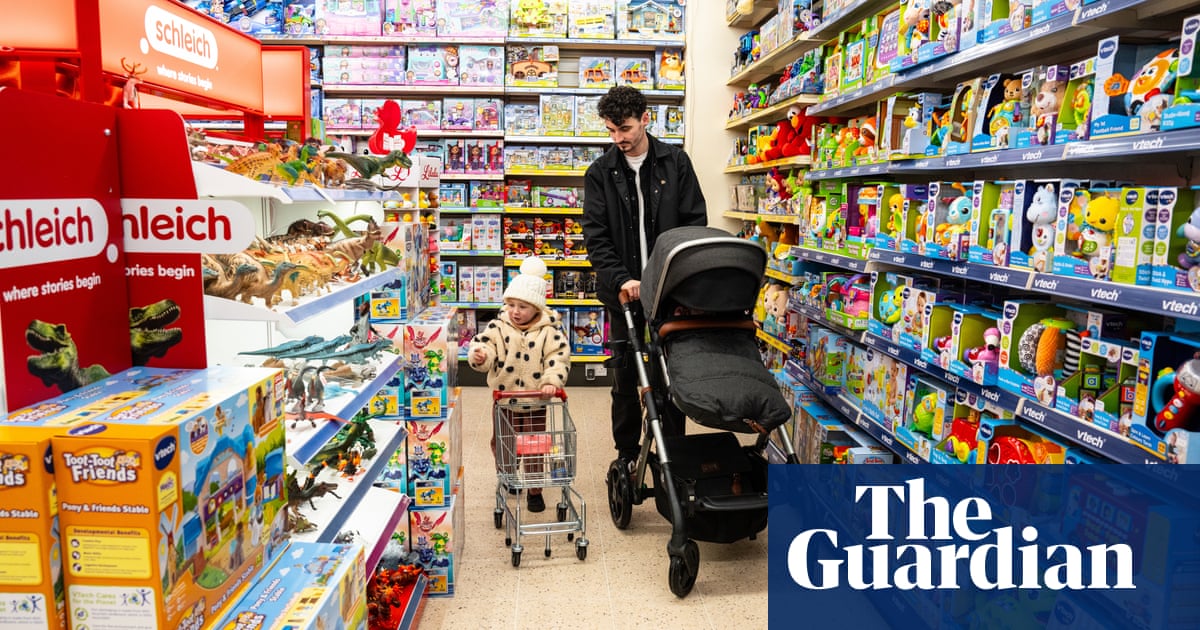
At a toy factory in south-east China, boxes of plastic dart guns are stacked across the floor. Sometimes, so many packages pile up that they stretch into the production area, slowing the work of making more toys.
What to do with all the blaster guns, which have been sold to retailers in the UK but cannot find room on ships to get them there, is a problem for Nick Mowbray, the co-founder of Zuru Toys. The company expects to generate about $1.1bn (£815m) in revenue this year thanks to surging demand for products such as 5 Surprise Mini Brands, Rainbocorns and X-Shot blasters.
But Mowbray says there will be toy shortages this Christmas. Shipping constraints, power outages and a lack of workers to stitch soft toys are all hurting production. Mowbray says stress points throughout the “delicate” manufacturing ecosystem mean some toys will cost consumers more, and some will not make it under the tree at all.
Too many factories
The problems begin in China. Zuru Toys makes about 600,000 toys each day at 20 factories across China. Manufacturers have flooded into the country from places such as India and Vietnam over the past year, as Covid-19 outbreaks have left factories struggling and China has kept outbreaks under control. Mowbray says a “whole heap of manufacturers moved back to China” because it has managed the virus well. But the world’s second largest economy and manufacturing powerhouse has a big challenge: not enough power.
The electricity crisis
The influx of production has drained power supplies and China continues to grapple with severe energy shortages. It is driven in part by an enormous hunger for goods as the world reopens from the pandemic. Tight coal supplies and stricter emissions standards have also led to power outages, halting production at some factories. Mowbray says on top of those pressures, cryptocurrency miners – though technically banned in China – continue to operate and “use a tonne of electricity”.
“So now we have the electricity crisis in China,” he says. “It’s a huge constraint.” In response Beijing has rationed power and imposed energy limits. Mowbray says the restrictions at factories in the Guangdong province – where some of Zuru’s most popular toys are made – would have cut capacity in half. Zuru has created a workaround – building “mini-power stations”, laying concrete, constructing new buildings and equipping sites with generators – to keep output at those factories ticking at 100%.
Worker shortages
Mowbray says for now, generators have solved the power issues but the company faces other production headaches. Certain factory workers are scarce in China and the swelling appetite for consumer goods has made labour shortages worse. Finding workers who can sew is “a nightmare right now” and that has dealt a heavy blow to the soft toy market, he says. “We’re having massive constraints in our plush products … all of China is facing that.” That means any toy with a soft component – from a cuddly teddy bear to a plastic doll house fitted with fabric bedspreads – will be harder to get.
Container crisis
By far the biggest issue, Mowbray says, is shipping. The world is in the grip of a supply chain crisis that stretches from Asia to the US and Europe. It has been caused by a series of connected issues that include the surge in demand for goods, and not enough workers to distribute them. Maritime trade crashed at the start of the pandemic, then as the world began to reopen, demand for energy, labour and transport leapt. That has led to backlogs at the world’s busiest container ports, including the UK’s largest in Felixstowe. Worker shortages on the ground tightened bottlenecks even further.
“Every week is a battle for us trying to get product on to vessels,” says Mowbray, and container prices have skyrocketed. He says a container from China to the UK would have previously cost about $2,000-$3,000 (£1,480-£2,200) – now it is more than $20,000. It means Zuru struggles to get toys it has already sold to UK customers like The Entertainer, Tesco and Argos out of the factory door.
Competition for space on vessels is so tight that some retailers have waited up to four months to get Zuru toys on a container ship. In that amount of time, its factories fill with already-sold stock. “In some cases we have to stop production because there’s no more room to store products,” Mowbray says.
With its warehouse already full, stocks of X-Shot blasters at one point flowed into the production area. “It’s an enormous factory, 70,000 sq metres of space … we had to take space outside, down the road.” He says Zuru held up to $70m in inventory that retailers had bought. That is now down to about $18m, still sitting in the factory warehouse.
Driver shortage
Once the toys finally make it to the UK, the challenge becomes finding a truck to deliver them to the retailer. At major ports in the UK and the US, heavy backlogs have left ships unable to dock and unload. There is also a problem with a lack of workers – namely HGV drivers in Britain – to deal with all those goods. In the haulage and warehousing industries, Brexit and Covid-19 are blamed for chronic labour shortages. The government pointed the finger at coronavirus – at least in part – for the driver shortage, saying the pandemic delayed 40,000 HGV driving tests. At the same time, some industry bosses argue Brexit cut off supplies of long relied upon European workforces.
Gary Grant, the chair of The Entertainer, says there are issues with deliveries from UK ports to its chain of 172 toy stores owing to the delivery driver shortage. He warns there may be difficulties in restocking popular items once the festive buying season takes off in November.
Price hikes and Christmas jitters
Mowbray says the pressure points along the toy supply chain – in particular the surge in shipping costs – will leave retailers with “no choice” but to raise prices. For the X-Shot blaster range, he says, prices in the UK have risen anywhere from 10-15% on toys that sell for £10 to £30. “Inflation is coming in a big way,” he says. “There won’t be one of our brands that won’t have shortages for Christmas.”
The Entertainer, meanwhile, believes that the challenges in China will not affect Christmas but could hit toy supplies moving into the school holiday period. “We are never going to be out of toys but there might not be certain toys in the market as early as there would have been,” Grant says.












